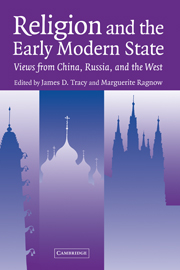Book contents
- Frontmatter
- Contents
- Contributors
- Acknowledgments
- Preface
- Religion and the Early Modern State
- Introduction
- PART I LIVED RELIGION AND OFFICIAL RELIGION
- 1 The Alternative Moral Universe of Religious Dissenters in Ming-Qing China
- 2 Ecclesiastical Elites and Popular Belief and Practice in Seventeenth-Century Russia
- 3 The State, the Churches, Sociability, and Folk Belief in the Seventeenth-Century Dutch Republic
- 4 Communal Ritual, Concealed Belief: Layers of Response to the Regulation of Ritual in Reformation England
- PART II FORMS OF RELIGIOUS IDENTITY
- PART III THE SOCIAL ARTICULATION OF BELIEF
- AN EPILOGUE AT THE PARISH LEVEL
- Selected Annotated Bibliography of Secondary Works
- Index
1 - The Alternative Moral Universe of Religious Dissenters in Ming-Qing China
Published online by Cambridge University Press: 23 May 2010
- Frontmatter
- Contents
- Contributors
- Acknowledgments
- Preface
- Religion and the Early Modern State
- Introduction
- PART I LIVED RELIGION AND OFFICIAL RELIGION
- 1 The Alternative Moral Universe of Religious Dissenters in Ming-Qing China
- 2 Ecclesiastical Elites and Popular Belief and Practice in Seventeenth-Century Russia
- 3 The State, the Churches, Sociability, and Folk Belief in the Seventeenth-Century Dutch Republic
- 4 Communal Ritual, Concealed Belief: Layers of Response to the Regulation of Ritual in Reformation England
- PART II FORMS OF RELIGIOUS IDENTITY
- PART III THE SOCIAL ARTICULATION OF BELIEF
- AN EPILOGUE AT THE PARISH LEVEL
- Selected Annotated Bibliography of Secondary Works
- Index
Summary
Elsewhere in this volume, Professor Romeyn Taylor offers a nuanced portrayal of Chinese religions. He identifies four traditions, with overlapping deities and shared common assumptions, but with different rituals and varying degrees of “officialness.” There is, however, a fifth tradition in the Chinese religious world, one that is qualitatively different from the other four. One can argue that the other four traditions are expressions of one orthodox camp, while this fifth tradition is indisputably heterodox by contrast. It is the late imperial version of this fifth tradition, making its appearance at the beginning of the sixteenth century in China, that is the focus of this essay.
Couched in the framework of orthodoxy versus heterodoxy, this chapter attempts to establish the following points: (1) an orthodoxy existed in China since the middle of the second century before the common era and lasted until the turn of the present century; (2) this orthodoxy was not articulated by a religious authority, but rather by a political authority; (3) the content of this orthodoxy, sociopolitical and ethical in emphasis, was defined not by narrow sectarian doctrines but by a compromise consensus among all the major religious traditions in China; (4) challenge to this orthodoxy, long-lasting and variegated in nature, crystalized at the turn of the sixteenth century into a potent tradition revolving around a central matriarchal deity and a strong millenarian and eschatological vision; (5) this heterodox tradition, though similarly socioethical in content, was by definition also politically subversive and occasionally erupted into antidynastic rebellions.
- Type
- Chapter
- Information
- Religion and the Early Modern StateViews from China, Russia, and the West, pp. 13 - 51Publisher: Cambridge University PressPrint publication year: 2004
- 3
- Cited by



